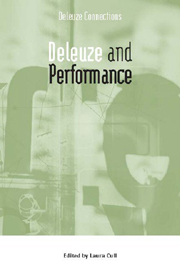Book contents
- Frontmatter
- Contents
- Introduction
- 1 Performing in the Chaosmos: Farts, Follicles, Mathematics and Delirium in Deleuze
- Act I Deleuze on Theatre: Artaud, Beckett and Carmelo Bene
- Interval
- 5 Performing, Strolling, Thinking: From Minor Literature to Theatre of the Future and Off the Beaten Path or, Notes Towards a Heideggerian Deterritorialisation: A Response to Daniel Watt
- Act II Confronting Deleuze and Live Performance
- Interval
- Act III A Digital Deleuze: Performance and New Media
- Notes on Contributors
- Index
5 - Performing, Strolling, Thinking: From Minor Literature to Theatre of the Future and Off the Beaten Path or, Notes Towards a Heideggerian Deterritorialisation: A Response to Daniel Watt
from Interval
Published online by Cambridge University Press: 12 September 2012
- Frontmatter
- Contents
- Introduction
- 1 Performing in the Chaosmos: Farts, Follicles, Mathematics and Delirium in Deleuze
- Act I Deleuze on Theatre: Artaud, Beckett and Carmelo Bene
- Interval
- 5 Performing, Strolling, Thinking: From Minor Literature to Theatre of the Future and Off the Beaten Path or, Notes Towards a Heideggerian Deterritorialisation: A Response to Daniel Watt
- Act II Confronting Deleuze and Live Performance
- Interval
- Act III A Digital Deleuze: Performance and New Media
- Notes on Contributors
- Index
Summary
I am not at home.
True, I am sacked by skin but something is not right.
I'll walk a while
without the least hope of finding a way out
or in.
This begins, as does Anti-Oedipus, with a schizo stroll.
I am imagining Heidegger. He is walking in those dark woods that surround ‘die hütte’ at Todtnauberg in the Black Forest. It is winter and there is a heavy snowfall. The thick canopy of branches has protected the Pathmarks but, deep in thought, he is still some way Off the Beaten Track. These mountain tracks – or to use the German of Heidegger's book: Holzwege – are dead ends (as we shall examine later). They are paths that end abruptly, seemingly leading nowhere. In What is Philosophy? Deleuze and Guattari discuss the territory of philosophy, and the ground upon which its foundations shakily rest. Heidegger is obviously a very particular thinker of a very particular thinking of territory:
Heidegger lost his way along the paths of the reterritorialization because they are paths without directive signs or barriers. Perhaps this strict professor was madder than he seemed. He got the wrong people, earth and blood. For the race summoned forth by art or philosophy is not the one that claims to be pure but rather an oppressed, bastard, lower, anarchical, nomadic, and irremediably minor race…
(Deleuze and Guattari 1994: 109)- Type
- Chapter
- Information
- Deleuze and Performance , pp. 91 - 106Publisher: Edinburgh University PressPrint publication year: 2009



